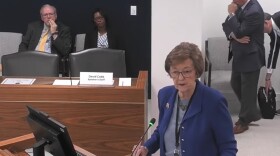Republican lawmakers have been moving slowly on state budget negotiations. They finally reached a compromise Wednesday on how much revenue they will rely on from the state lottery. But that came after hours of finger-pointing and debate over other education issues, including teacher pay.
Before negotiations even began on Wednesday morning, the mood felt sour. Senate leaders weren’t happy that the House had invited school leaders to argue against cutting teacher assistant jobs. Senator Harry Brown objected before the guests could even make their way to the podium.
“Even our own members in the House and Senate aren’t allowed to speak in this meeting, I don’t think this meeting should allow others unless both parties are in agreement,” Brown said.
House leader Nelson Dollar dismissed Brown’s concerns. He argued that conference committees can do as they wish, including bringing in outside speakers.
“Well then, Mr. Chairman, I think this meeting is adjourned,” retorted Brown.
Without hesitation, senate leaders got out of their chairs in unison, grabbed their things and filed out of the quiet, tension-filled room.
Some public spectators softly gasped, but House members barely flinched. Dollar continued.
“Well the House is not adjourned and we will call the first individual to speak, Mr. Heath Morrison…”
Senate and House leaders have been at odds over how much to pay teachers and at what cost. The House wants to give them an average five percent raise. The Senate, on the other hand, wants to give about 11 percent, but their plan would cut more than 7,000 teacher assistants to help pay for them.
That’s why the House brought in a handful of school leaders to talk about how teacher assistants are critical and enhance the classroom. But without the Senate in the room, House members simply preached to the choir.
An hour later, Senators quietly walked back into the room. But they still weren’t happy. Senator Harry Brown spent seven long minutes lecturing the House.
“I think it’s time for the House to understand that this is a negotiation. Somebody’s going to have to come to the middle to settle this. We’re willing to do that,” Brown said.
Senate leaders tossed around different ideas. At one point, they proposed keeping all of the teacher assistants and still giving an 11-percent raise. But House members said that would impossible to fund without impacting Medicaid.
When the House presented its proposal, Senators nearly rolled their eyes. Jerry Tillman said it looked exactly like their original plan.
“This barely worth the ink it took to write this thing. I don’t see any differences, folks we’re not getting these big issues solved at all…we need to make some decisions on those key issues and move on,” he said.
Legislators kept reiterating how they need to move on. Many of them even joked about hanging around until Christmas.
“We’ve got to have structured and focused discussion on bridging the gap for teacher pay and having a discussion about the merits of the two positions, on the aged, blind and disabled, and then we’ll get done and then we can have Christmas in July,” said House Speaker Thom Tillis.
A few people snickered at his comment, but it kind of came true. When lawmakers returned for their afternoon meeting, someone had set up some Christmas lights, a wreath, stockings and even a lump of coal where the chairman stands.
The mood was less tense. Lawmakers even came to a compromise on lottery revenue. House leaders offered not to lift the cap on lottery advertising in order to bring in millions of dollars. Senate leaders had expressed doubt over their revenue projections.
“Part of the negotiation is trying to eliminate as many of the areas of conflict as possible, I think that’s one of the things we did this afternoon,” said Tillis.
But, of course, there’s still conflict over teacher pay. Lawmakers say they’ll try to meet in the middle, and to negotiate more and argue less.








